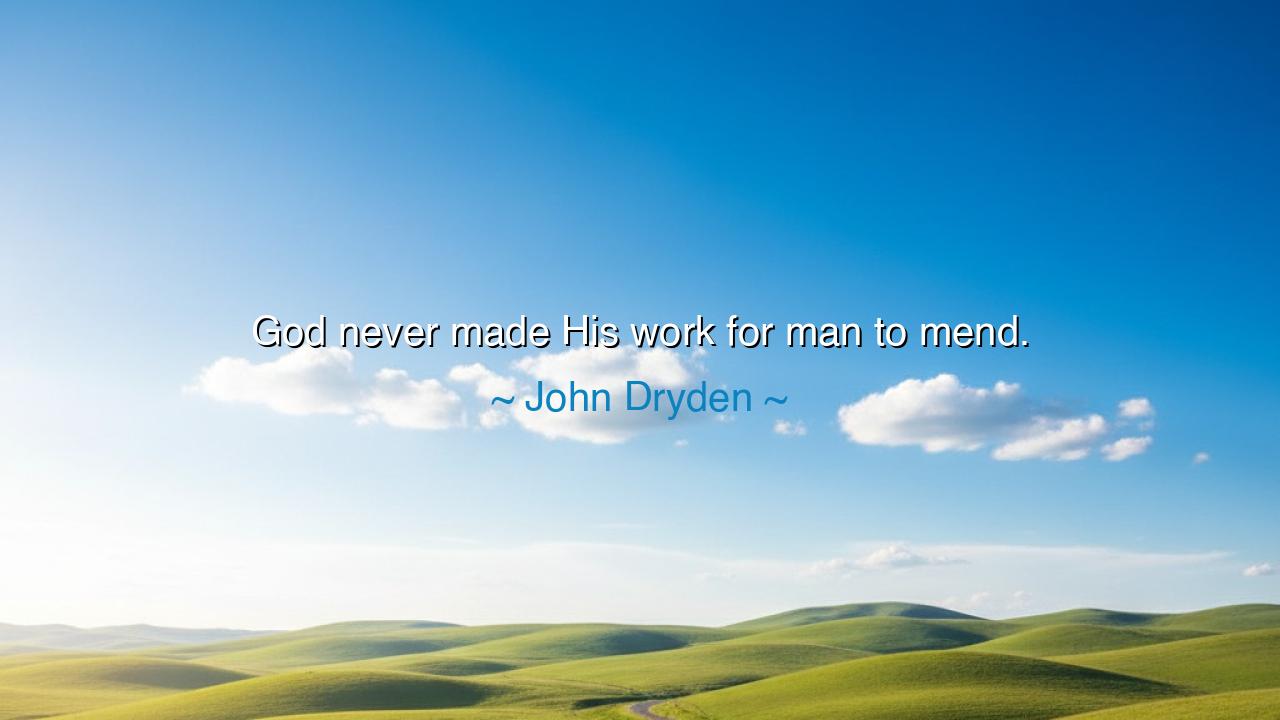
God never made His work for man to mend.






In the solemn words of John Dryden, “God never made His work for man to mend,” there is a profound truth about the order of the universe and the limits of human power. God, the eternal Creator, has woven the fabric of existence with divine wisdom beyond mortal comprehension. The stars in their courses, the seas in their depths, and the rise and fall of empires are part of a grand design that no man can fully grasp. To attempt to mend what is perfect in its divine purpose is to presume mastery over that which was never ours to command.
The origin of these words springs from the ancient belief that the cosmos was not born of chaos alone, but of divine intention. In the days of old, prophets, sages, and poets gazed upon the heavens and understood that there is a harmony set by the Creator, a balance that mortals disturb at their peril. Dryden, speaking in an age of reason and conflict, reminds us that while man may labor and strive, his power is but a shadow compared to the infinite hand of God.
To mend the divine work is often an act of arrogance rather than wisdom. Mortals, blinded by ambition, may seek to alter the natural course of life, whether through the pursuit of excessive power, the corruption of justice, or the desecration of nature itself. Yet history has shown that such meddling brings ruin. As rivers flood when their course is forced, so too does human pride overflow when it tries to reshape the will of God.
Thus, these words are a lesson in humility and trust. Let man focus on the tasks given to him—acts of compassion, stewardship, and understanding—while leaving the greater mysteries to the divine. For what God has fashioned is whole, even when it appears broken to mortal eyes. To accept this truth is to walk in harmony with creation, honoring the Creator’s design and finding peace in the knowledge that the universe is as it was meant to be.






NH7/1 10.Nguyen Thi Ngoc Han
John Dryden’s quote speaks to the awe and humility we should have towards the natural world, but it also raises questions about human agency. If we are given the ability to alter and shape the world, should we not use that power for good? The balance between accepting God’s work and improving the world for future generations seems tricky. How do we navigate this tension between divine perfection and human responsibility?
CLChi Linh
The quote by Dryden suggests a reverence for the world as it was created, but I wonder if it also implies a passivity when it comes to addressing the issues we face today. While it’s true that nature is often in balance, can we really afford to say that we shouldn’t attempt to mend things like environmental damage or social injustice? Shouldn’t we feel a sense of responsibility to care for and improve upon what we have been given?
MHMinh h'
Dryden’s perspective on the perfection of God’s creation made me think about the concept of ‘imperfection.’ If we believe God’s work is perfect, how do we reconcile that with the existence of suffering and challenges in the world? Is the natural world truly flawless, or are imperfections simply part of the larger, more complex plan? Does this quote encourage us to embrace the idea that we can’t fix everything, and some things are beyond our control?
LNLoan Nguyen
John Dryden’s quote is a reminder of the humility required when it comes to the natural world. The idea that humans are not meant to ‘mend’ God’s work suggests that perhaps we should have more respect for what we inherit. But what happens when there are parts of the world that do need mending—like environmental damage or inequality? Can there be a balance between respecting nature and taking responsibility for our actions?
LALE AN
Dryden's quote raises an interesting question about the role of human beings in the world. If God’s creation is perfect, why are humans driven to improve, alter, or ‘mend’ it? Does this desire stem from a belief that we know better than what was originally created, or is it a reflection of human nature to seek control over everything around us? What do you think the quote says about the balance between accepting things as they are and striving for progress?